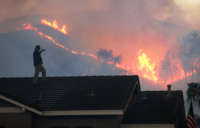
Massive wildfires have shattered records across the world in recent years, including in the western United States, where deadly blazes forced mass evacuations in 2020 and filled the sky across entire regions with smoke. Globally, wildfires are becoming more frequent, destructive and burning more land — and this trend is set to continue. Even under a “best case” scenario where greenhouse gas emissions are rapidly reduced in the coming decades and global warming is limited to 2 degrees Celsius, climate change will still drastically increase the size and likelihood of destructive wildfires globally, according to a new international study published in Environmental Research Letters.
It’s essential to reduce warming as much as possible to avert wildfire catastrophes, according to the study’s authors. Limiting warming further by even half a degree — to 1.5 degree Celsius, the rosiest of climate projections — would substantially reduce the danger of fire across the most populated continents, including in the African Sahara as well as the Amazon rainforest, which saw alarming outbreaks of forest fire in 2019 and 2020. Climate disruption contributes to heat waves, droughts and other factors that create prime conditions for wildfires and lengthen regional fire seasons — fueling a dangerous “feedback loop” as fires put more carbon dioxide into the air.
Under the Paris Climate Accord, countries around the world agreed to pursue efforts to limit global warming to between 1.5 and 2 degrees Celsius above preindustrial levels. These numbers are based on projections of what the world will look like over the course of a generation as temperatures rise. However, since the international goal posts were announced in 2015, scientists have warned that these “best case” targets are probably not achievable.
To achieve an increase of only 1.5 degrees by 2100, carbon and other greenhouse gas emissions must be rapidly reduced in the coming decades and brought to net-zero by 2050. Under the current climate policies in place in the U.S. and across the world, the Earth is projected to warm by about 2.9 degrees by 2100, according to the Climate Action Tracker, which compares climate action across governments to the goals set by the Paris agreement.
Even if governments across the world meet their most aggressive emissions reduction pledges and targets — including President Joe Biden’s hope for the U.S. to achieve net-zero emissions by 2050 — global temperatures would increase between 2.1 to 2.6 degrees Celsius. Without any climate action, temperatures would warm by more than 4 degrees by the end of the century, causing up to two meters of seal level rise globally.
Most of the research on climate and wildfires focuses on more extreme emissions scenarios, and a team of scientists from South Korea, Japan and the U.S. wanted to know if wildfires would get worse even if humans achieve our most ambitious climate goals. Using 1.5 and 2 degree Celsius in warming as benchmarks, the team projected various fire weather conditions, such as temperature, humidity and windspeed, and concluded that fire-prone weather conditions will be more extreme in the future regardless of the degree of warming, although, of course, fires would likely be worse and more prevalent under the highest warming scenarios.
“Although it is reasonable to look at fire weather under more extreme circumstances, there is little sense in making goals without a good understanding of what might happen if you were to reach those goals,” said co-author Seung-Hee Kim of Chapman University, in a statement. “So, we asked ‘what would happen if we did reach these goals? Would the fire weather conditions not become as severe?'”
The answer to this question is complicated, but the connection between wildfires and climate change is clear. In the western U.S., for example, researchers have found human-caused climate change caused hotter, drier conditions that doubled the number of acres of land and forest burned since the mid-1980s. The number of dry, hot and windy autumn days that are perfect weather for fires has doubled in California, which saw its worst fire season on record last year. Climate change has extended the annual fire season in the U.S. by an average of 78 days since 1970, draining firefighting resources at both the state and federal levels.
Working with the Gwangju Institute of Science and Technology in South Korea, Kim’s team did find a silver lining in their research. By comparing fire weather projections based on 1.5 and 2 degrees of warming, the scientists determined that limiting warming by even half a degree could substantially reduce fire risk, especially in high danger areas, such as the Amazon rainforest, African savannahs and much of the Mediterranean. The researchers concluded that warming temperatures remain a “principal factor” behind increased fire risk, although the impact of human land-use decisions requires further study.
“If we were somehow able to suppress this extra half a degree of warming, we could reduce climate-driven extreme fire activities in many places, potentially saving many lives and billions of dollars,” said co-author Simon Wang of Utah State University.
However, Wang said countries such as Australia and Indonesia will likely face “peak levels of fire susceptibility” before global average temperatures increase by 1.5 degrees Celsius, putting those areas at risk for more extreme fire seasons in years to come. Despite denialism among conservative politicians, warming temperatures in the U.S. have already contributed to record-breaking fire seasons as forests continue to die from a variety of climate-related stressors, with five of the six largest wildfires in California’s history erupting in 2020 alone.
The wildfire research is just the latest evidence that a world unchanged by the climate crisis has already disappeared in the rearview mirror. At this point, the actions governments and economies take over the next few decades can only determine how much worse it will get.
